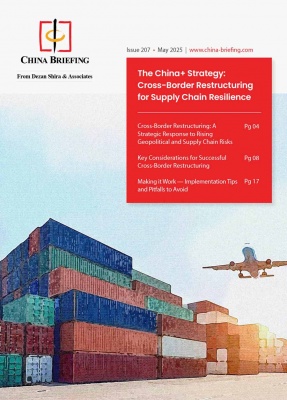E-Commerce in China as Part of a Digital Revolution
Sponsored Post

China’s e-commerce landscape has grown and changed over the past two decades, capturing the rise of consumer income as the economy in China booms ahead of other countries.
The Asian powerhouse has the largest e-commerce market in the world, with over three trillion dollars in annual sales, accounting for over half of the world’s online sales.
This growth is due to various factors, such as smartphone and internet penetration, alternative payment solutions, live streaming, and the government’s support. The rise of e-commerce in China has impacted the consumer market, retail landscape, and logistics industry. Continue reading to find out how.
The Rise of China’s E-Commerce Industry
China’s e-commerce industry has proliferated due to several factors. The Chinese government has implemented various policies to support e-commerce and the digital economy, especially in expanding internet infrastructure and encouraging entrepreneurship.
China has advanced mobile technology and internet connectivity, making e-commerce available and accessible around the country, whether for consumers or business owners. Residents can also access diverse mobile payment solutions like Alipay and WeChat Pay to make convenient online transactions.
The younger generation of Chinese consumers are tech-savvy and prefer the ease and variety offered by e-commerce platforms to other forms of purchase. Giants like Alibaba, JD.com, and Taobao dominate China’s e-commerce industry.
Due to the massive demand for material goods, this industry attracts many individual and foreign investors. This level of diversity also leads to interest in investments like stocks related to e-commerce companies and forex, encouraging many young people to enter the trading scene using an online Singapore forex broker and other online platforms to make investments.
Impact of E-Commerce on China’s Consumer Market

E-commerce platforms have transformed China’s consumer market, providing unparalleled access to different kinds of products. These platforms have led to rapid online shopping growth and influenced consumer behavior through features like live streaming. All of these contribute to the country’s economic development, making China the largest e-commerce market in the world.
The critical impact of e-commerce platforms on China’s consumer market is increased accessibility. Chinese consumers can easily access products from domestic and international brands. What’s more, consumers from around the world now have easy access to Chinese products through the same online platforms. Companies like Alibaba and JD.com have become vital channels for foreign companies to tap into China’s consumer base, as luxury goods and essential household items are readily available.
E-commerce in China has empowered consumers, as they have better access to information about products, customer reviews, and comparative pricing. These platforms allow for easy price comparisons between sellers, leading to better deals and competitive pricing.
The e-commerce revolution in the country has created an integrated financial ecosystem, as digital payment services offer seamless, secure, and instant transactions. It has increased consumption among populations and led to a culture of convenience in the Chinese consumer market.
How It Affects the Retail Landscape in China
E-commerce platforms have fundamentally transformed the retail landscape in China, primarily by increasing the share of online shopping and causing consumer behavior to shift towards digital purchasing. This shift is also due to social media integration, rapid delivery services, and live streaming, leading to a dynamic and innovative retail environment.
E-commerce has led to a decline in traditional retail, causing physical stores to adapt by moving their operations online. Many retailers are combining online and offline experiences, allowing consumers to visit the stores or purchase them online. It has also led to the rise of new retail formats like livestreaming commerce and social e-commerce through platforms like TikTok.
What’s more, the playing field in China is quite equal for all kinds of businesses, from small to large companies. E-commerce enables small businesses to reach millions of potential customers without high upfront costs, spurring an entrepreneurial boom in China.
These changes allow the massive country to boast the most extensive online retail market globally, as these platforms sell many consumer goods online. It has increased mobile commerce and social commerce innovation, feeding the market with more goods, increasing demand, and ensuring supply to national and international customers.
Influence on the Country’s Logistics Industry

The logistics industry is an essential element of the rise of e-commerce in China and the digital revolution. E-commerce platforms have led to a massive increase in demand for delivery services all around China, and this demand extends outside the country.
It has also led to extensive warehousing networks and better technology like tracking systems and delivery apps. Companies like Alibaba have built extensive warehouse and distribution networks across China for faster delivery times. Better logistics technology for GPS tracking, automated sorting, and data analytics exists.
E-commerce platforms have driven the development of logistics networks in rural areas, too. Thanks to mobile shopping, China’s rural population has easy access to urban markets and diverse goods, bridging the gap between rural and urban consumers. Even farmers and rural entrepreneurs can use e-commerce to reach a national audience.
Technological Advancements Driving China’s Digital Revolution
Aside from logistics technologies like GPS tracking and data analytics and the rise of mobile commerce, there are new technological advancements in China’s e-commerce industry.
Cloud Computing
Cloud computing has become integral to China’s e-commerce industry, as many businesses use it to drive digital transformation. Some of the top cloud computing companies are Alibaba, Baidu and Tencent. Alibaba uses its cloud computing division to power its online shopping platforms with AI-driven logistics.
Artificial Intelligence and Machine Learning
Innovative Chinese brands leverage artificial intelligence and machine learning technologies to revolutionize e-commerce, customer service, and logistics. With AI-powered predictive analytics, they can optimize supply chains and improve delivery efficiency.
E-Commerce as an Essential Part of China’s Economy
The rise of e-commerce in China has transformed the consumer market, making shopping so much more accessible, convenient, and personal.
It has also positively disrupted the retail landscape, creating new business models and leveling the playing field for small businesses.
The logistics industry has led to advanced infrastructure development, allowing for rapid delivery. As e-commerce evolves, these platforms are driving innovations and creating competition on a global scale.
- Previous Article China’s Enhanced Beneficiary Owner Filing System: Key Points of New Measures
- Next Article Understanding China’s New Carbon Accounting Plan: Green Compliance and Opportunities

























